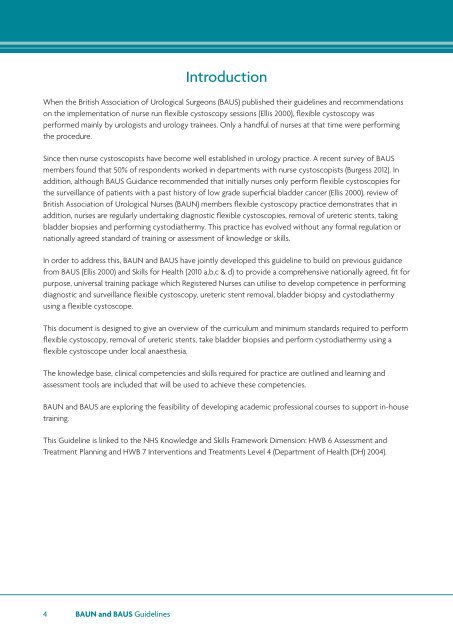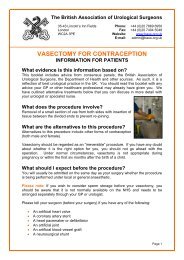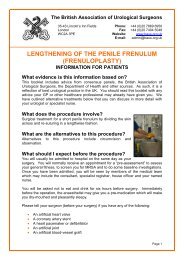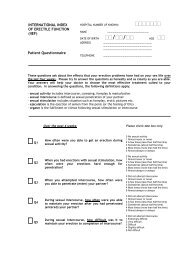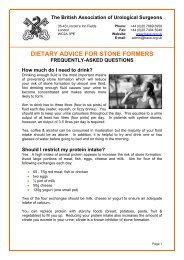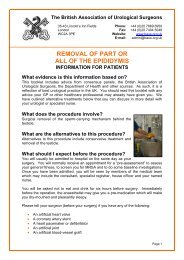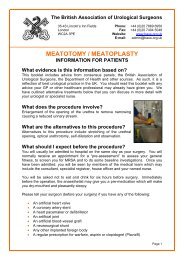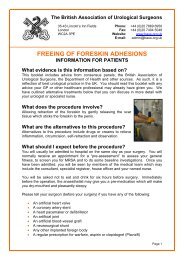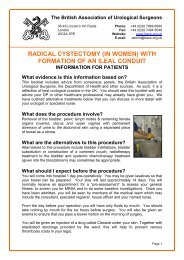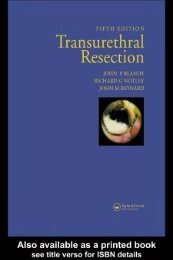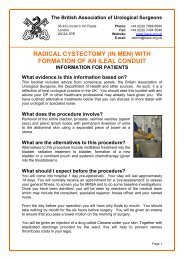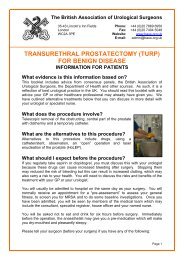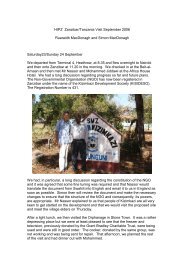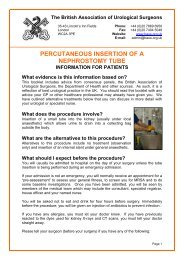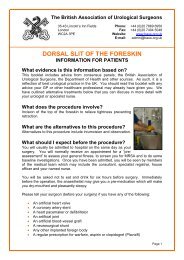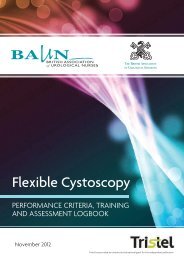Guideline - British Association of Urological Surgeons
Guideline - British Association of Urological Surgeons
Guideline - British Association of Urological Surgeons
Create successful ePaper yourself
Turn your PDF publications into a flip-book with our unique Google optimized e-Paper software.
Introduction<br />
When the <strong>British</strong> <strong>Association</strong> <strong>of</strong> <strong>Urological</strong> <strong>Surgeons</strong> (BAUS) published their guidelines and recommendations<br />
on the implementation <strong>of</strong> nurse run flexible cystoscopy sessions (Ellis 2000), flexible cystoscopy was<br />
performed mainly by urologists and urology trainees. Only a handful <strong>of</strong> nurses at that time were performing<br />
the procedure.<br />
Since then nurse cystoscopists have become well established in urology practice. A recent survey <strong>of</strong> BAUS<br />
members found that 50% <strong>of</strong> respondents worked in departments with nurse cystoscopists (Burgess 2012). In<br />
addition, although BAUS Guidance recommended that initially nurses only perform flexible cystoscopies for<br />
the surveillance <strong>of</strong> patients with a past history <strong>of</strong> low grade superficial bladder cancer (Ellis 2000), review <strong>of</strong><br />
<strong>British</strong> <strong>Association</strong> <strong>of</strong> <strong>Urological</strong> Nurses (BAUN) members flexible cystoscopy practice demonstrates that in<br />
addition, nurses are regularly undertaking diagnostic flexible cystoscopies, removal <strong>of</strong> ureteric stents, taking<br />
bladder biopsies and performing cystodiathermy. This practice has evolved without any formal regulation or<br />
nationally agreed standard <strong>of</strong> training or assessment <strong>of</strong> knowledge or skills.<br />
In order to address this, BAUN and BAUS have jointly developed this guideline to build on previous guidance<br />
from BAUS (Ellis 2000) and Skills for Health (2010 a,b,c & d) to provide a comprehensive nationally agreed, fit for<br />
purpose, universal training package which Registered Nurses can utilise to develop competence in performing<br />
diagnostic and surveillance flexible cystoscopy, ureteric stent removal, bladder biopsy and cystodiathermy<br />
using a flexible cystoscope.<br />
This document is designed to give an overview <strong>of</strong> the curriculum and minimum standards required to perform<br />
flexible cystoscopy, removal <strong>of</strong> ureteric stents, take bladder biopsies and perform cystodiathermy using a<br />
flexible cystoscope under local anaesthesia.<br />
The knowledge base, clinical competencies and skills required for practice are outlined and learning and<br />
assessment tools are included that will be used to achieve these competencies.<br />
BAUN and BAUS are exploring the feasibility <strong>of</strong> developing academic pr<strong>of</strong>essional courses to support in-house<br />
training.<br />
This <strong>Guideline</strong> is linked to the NHS Knowledge and Skills Framework Dimension: HWB 6 Assessment and<br />
Treatment Planning and HWB 7 Interventions and Treatments Level 4 (Department <strong>of</strong> Health (DH) 2004).<br />
4<br />
BAUN and BAUS <strong>Guideline</strong>s


